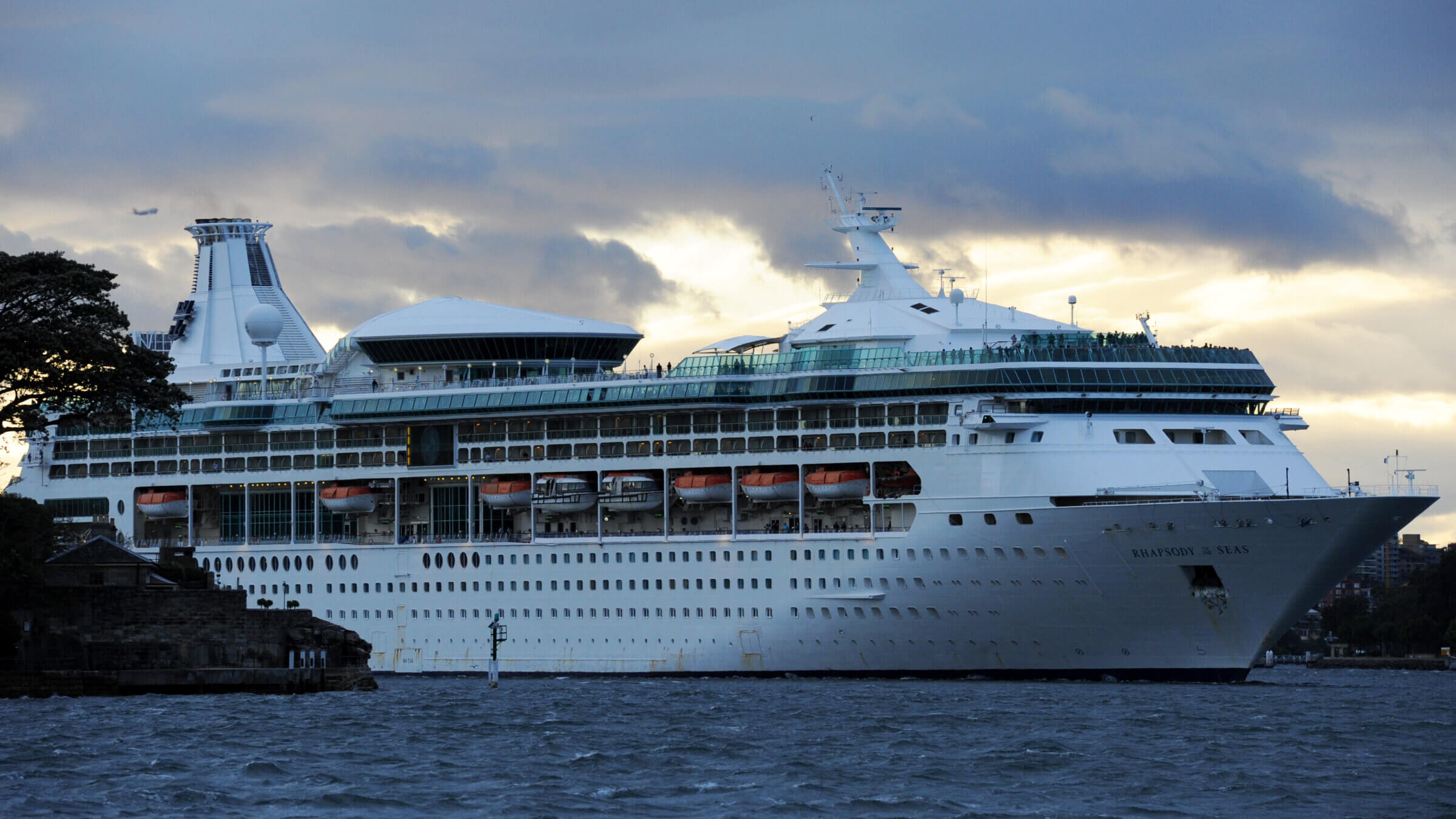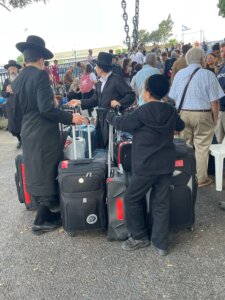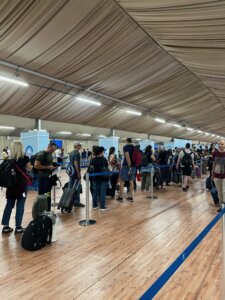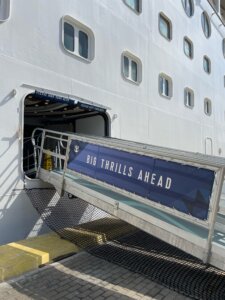On board a massive cruise ship, Americans escape Israel — en route to Cyprus and parts unknown
From Haifa, nearly 200 set sail on the Royal Caribbean Rhapsody, chartered by the US government

The Rhapsody, a Royal Caribbean cruise ship. Photo by Getty Images
ABOARD THE ROYAL CARIBBEAN RHAPSODY OF THE SEAS – The passengers were greeted with sparkling wine and mimosas. A rabbi was on hand to assure them there’d be kosher options alongside the lavish buffet. Each was allowed to bring a 50-pound suitcase and a carry-on, but no pets.
And they had to sign promissory notes committing to reimburse the United States government for the cost of their passage, estimated at $300 to $500.
This was not your usual wartime evacuation.
With many flights from Israel canceled, the United States chartered this mammoth cruise ship to get its citizens out of danger. It has a capacity of 2,416, according to the T-shirts sold in the ship’s gift shop, but at the Haifa port on Monday, fewer than 200 souls climbed on board.
One was Rick Benjamin, 82, a lawyer who retired after 40 years practicing in Detroit and now spends his days responding to anti-Israel comments on the internet. Benjamin lives in Eilat with his daughter Mara Benjamin, a high school English teacher, and her two teenage children, who made aliyah in 2013.
In 1993, when Mara was in college, she won an essay contest on why she wanted to go to Israel, and won a week-long trip. Now, she told me, she has “lost a bit of trust in Israel to protect me.”
So they put their three cats and a dog into foster care. Rick Benjamin said they hoped it would be safe enough to return within a few weeks.
“I’m going to do what’s in my paranoid gut,” Mara said when I asked why she was leaving, on this eighth day after the Hamas terror attack launched this terrible war. “I’m going to watch what’s happening in Syria. If it’s just rockets, we’ll go home.”
Patriots and pilgrims
Evacuees began lining up at the Haifa port on Monday as early as 6 a.m., though the ship was not scheduled to leave until 5 p.m.
There were Christian pilgrims like Thu and Donna Nguyen, who live in California, and whose group of 24 mostly Europeans had gotten out earlier via Jordan. There was an American graduate student whose international lab program at the Technion had been disrupted — and who was hoping to see the USS George H.W. Bush, one of the world’s biggest warships, during the 12-hour cruise to Cyprus.

There was a woman who was seven months pregnant, fretting over whether she would have health insurance in the U.S.
Those departing were met by Heda Amir, a Haifa resident, who carried an Israeli flag and a pizza box bearing the slogan “Bring Them Back,” referring to the estimated 199 Israelis and foreigners taken hostage by Hamas.
Also at the port was David Rayner, 33, who is from Louisiana, works at a Haifa video game design company, and had offered his fellow Americans access to their building’s bomb shelter — a former bank vault — if a siren sounded.
He came to Israel with a Masa program just before the COVID-19 pandemic and then made aliyah.
“I’m the baby in the family,” he said, “and I’m the only one here in Israel. My dad always sheltered me. He wouldn’t even let me mow the lawn until I was 16. At the end of every conversation with my parents, they would ask ‘when are you coming home?’ But now my dad said, ‘If there’s anything you can do to help people, stay and help.’”
“My friends have guns,” he said. “They’re fighting. If they die, I die. I want to stay.”
‘You don’t leave family behind’

Rabbi Dovid Weberman welcomed people onto the ship. A native of Florida, he oversees kosher catering for the Royal Caribbean fleet of more than 60 ships. During the six-month Haifa sailing season, he and his wife live and work aboard the Rhapsody.
The ship left port a little after 3 p.m. – two hours ahead of schedule — accompanied by a U.S. warship off the port side, and (less visibly) by the Israeli navy and air force.
Not enough passengers assembled to make a minyan for afternoon prayers. On Oct. 7, the day Israel was attacked by Hamas, Rabbi Weberman said, 800 had gathered to pray in the ship’s theater.
“People have so many different needs,” he said. “Some need comforting. Some have experienced trauma. Some can’t process it just yet. They’re in denial. The basic thing is to listen. To see a figure like me brings a certain type of stability and a safe zone.”
A woman who spoke on the condition she only be identified by her first name, Aydela, was on her way to her sister’s home in Dallas with her two young children. Her husband, Orian, saw them off but then returned to their home in Rosh Haayin to care for their 10 cats. “You don’t leave family behind,” he explained.
Michele Barnett, who lives in Kalispell, Montana, said she was visiting her son, daughter-in-law and their seven children in the Golan Heights when the war broke out.
“I felt very safe at first until they started bombing,” she said.
‘My kids don’t know there’s a war on’
The ship’s Wi-Fi system was down during the evacuation cruise, but (like a Hanukkah miracle) cell phones worked two hours into the journey, cutting out just as sirens and booms sounded in Jerusalem.

Without internet, passengers switched from doomscrolling to doomsurfing the often-choppy images on the cabin TVs. Flipping among Israel’s Channel 13, the BBC, MSNBC, and Fox News, they could watch themselves being interviewed that morning at the port.
The ship’s shore excursion desk helped guests make hotel arrangements in Cyprus and reserve flights onward.
At 7 p.m., about 50 guests gathered in the Windjammer Café to sample the seafood paella, cheeseburgers, pork ribs, and freshly made donuts. A few families dined on packaged kosher meals in another restaurant.
Most were subdued, preoccupied. When one table spoke too loudly of missiles and bomb shelters, a mother traveling with her two young children asked them to keep it down.
“My kids don’t know there’s a war on,” she said. “They think we’re on vacation.”
The crew outnumbered passengers by more than 3:1, and provided the standard entertainment. A reggae band played on the pool deck. A jazz combo performed for an audience of three. Jumanji: Welcome to the Jungle screened in an empty theater.
A few people burned off their adrenaline in the fitness center. Some found that they were ravenously hungry for the first time in a week.
When the ship docked in Limassol early Tuesday morning, passengers were asked to disembark by 8 a.m. They were met by a large contingent of U.S. Embassy staff, military personnel, local security, and U.S. Ambassador to Cyprus Julie Fisher.
Then passengers were bused to local hotels and airports. Some were offered a charter flight to Vienna — a place some of their family members may have fled 80 years ago.
Some still didn’t know where they were going.





















